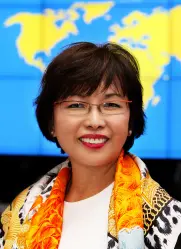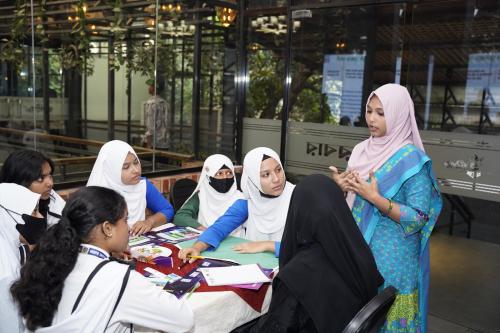

9:00 am EDT - 12:00 pm EDT
Past Event
9:00 am - 12:00 pm EDT
1775 Massachusetts Avenue NW
Washington, DC
20036
On April 17, the Center for Universal Education hosted members of the global education community for a public discussion on the two main challenges preventing the realization of universal education. As the clock winds down on the deadline to achieve the Education for All targets and Millennium Development Goals, there are still 61 million children out of primary school and another 71 million not enrolled in secondary school. There are 250 million children that have not mastered basic reading skills, and 200 million don’t have the relevant skills to support meaningful livelihoods. Evidence shows that education is one of the most effective ways to break the cycle of intergenerational poverty. Clearly, more must be done to ensure that all children are in school and learning, especially marginalized groups that are furthest behind.
The first panel examined issues related to financing education. CUE Director Rebecca Winthrop emphasized that although there is a $26 million financing gap for global education, donor support has stagnated and some countries like the Unites States, Canada, France, Japan, the Netherlands and Belgium have cut their foreign aid to education. Alice Albright, CEO of the Global Partnership for Education (GPE), pointed out that education ministers from developing countries are creating compelling education sector plans and working hard to improve their education systems. She stressed how important it is for governments and development partners to invest and support the efforts to help fund the $1.3 billion in pending GPE grants. She noted that innovative solutions could include financial transaction tax systems, local financing mechanisms, private sector partnerships and the use of technology. Nigel Chapman, CEO of Plan International, highlighted the importance of adding a gender lens to the issues of education. In an austere budgetary climate in many advanced economies where official development assistance is evaporating, it is essential that education is not forgotten because it requires complex and long term vision. Elizabeth King, director of Education for the World Bank’s Human Development Network, described the demand for education by countries, governments and communities. She highlighted how education is regularly cited as a top priority for people, even those living in fragile and conflict-affected contexts. King argued that this should send a strong message to the international community that education can play a role in building good citizenship within societies and can be a lever for growth and development. Therefore, it is important for resources to be used effectively and efficiently.
The second panel explored the need for more equitable and better quality education. CUE Senior Fellow Kevin Watkins presented data on the large numbers of out-of-school children in sub-Saharan Africa, and the causes of non-enrollment and school dropout, such as early marriage, child labor, conflict and poor educational quality. He pointed out that one of the biggest failings of the international donor community is the lack of provision within national education strategies to reach the most marginalized. Watkins emphasized that the reason why progress has stalled is largely because the same interventions and strategies are being used for marginalized groups when new and different approaches are needed. Baela Raza Jamil, director of programs at the Center of Education and Consciousness, described her work with the Annual Status of Education Report (ASER) in Pakistan and how she has been able to mobilize country-wide attention to issues around deficiencies in quality education in Pakistan.
She discussed the large-scale household and school assessment tools that have been created to measure differences within districts and across provinces. Jamil also talked about a new program, “Learning for Access”, that targets youth literacy and numeracy. Sumaya Saluja of the YP Foundation discussed the critical role that youth can play in tackling challenges in the education system. She described her work to measure school quality and her efforts to change traditional mindsets about girls’ education in India. Albert Motivan, head of Education Indictors and Data Analysis at UNESCO Institute for Statistics, presented evidence to illuminate the macro-level challenges facing global education, including UNICEF’s Out of School Initiative, which shows patterns of enrollment and progression across different segments of the global population. He also discussed the newly released report by the Learning Metrics Task Force, which outlines the different areas of learning that need to be measured, including readiness to learn, literacy and numeracy, competencies around analytic thinking, problem solving and ICT literacy.

10:45 am

Emily Gustafsson-Wright, Ema Eguchi, Elyse Painter, Victoria Arciniegas Gomez, Leydi Maldonado
June 30, 2025

Jennifer L. O’Donoghue, Christine Apiot Okudi, Ellen Chigwanda, Adefunke O. Ekine, Dasmine Kennedy, Joyce Kinyanjui, Pamhidzayi Berejena Mhongera, Sumbal Naveed, Mary Otieno, Jamila Razzaq, Atenea Rosado-Viurques, Nasrin Siddiqa, Tran Thi Ngoc Tran
June 30, 2025

Jennifer L. O’Donoghue
June 30, 2025